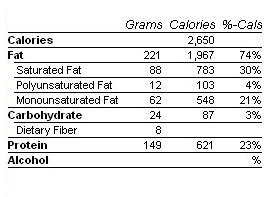Here are a few examples of a daily ketogenic diet menu. As you can see, it comes down to eating controlled portions of meat, as much fat as you like, and low carb veggies. Any hunger in between meals can be handled with low carb, high fat foods like celery with cream cheese, or an slice of cheese, or a handful of macadamia nuts.
I've analyzed the entire Day 1 menu and included the results in the graphic on the right. The protein grams are a little high but at that calorie intake, the percentage of protein in relation to the percentage of fat intake is perfect.

Day 1 Menu
Breakfast
- 2 eggs, fried in butter
- 1 ounce of chopped onion, or other low carb vegetable
- 1 oz of full fat cheese
- 4 slices bacon
- coffee with 1 oz heavy cream
Lunch
- 3 cups of salad greens
- 6 oz chicken breast strips, cooked in butter or olive oil
- 4 T high fat, low carb salad dressing
- 1 ounce of full fat cheese
- 1 celery stalk with 1 oz cream cheese
- water or unsweetened flavored sparkling water or other unsweetened beverage
Dinner
- 6 oz grilled or pan fried steak
- mushrooms sauteed in butter
- broccoli or other low carb vegetable
- water or unsweetened flavored sparkling water or other unsweetened beverage
- coffee with heavy cream
From me: I see that this day comes out to 2600 calories, which is pretty high for a normal sized person. I would recommend cutting down the protein, which would make the percentage of fat a little bit higher. I, for one, would gain a ton of weight eating all that protein!






